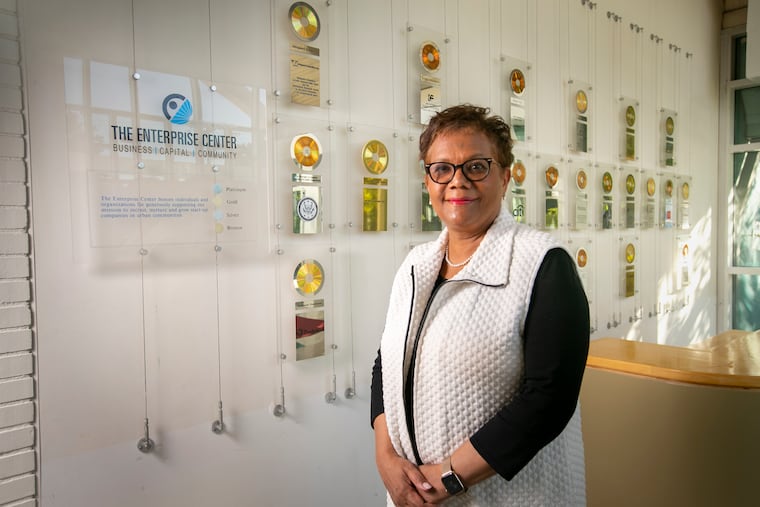New Philly-based $50 million private equity fund will invest in women, underrepresented entrepreneurs in Pa., N.J., and beyond
So far the for-profit Innovate Capital Growth Fund's snagged Bank of America, Independence Blue Cross, FS Investments' Michael Forman and Univest as investors.

Della Clark, president of the Enterprise Center of West Philadelphia, is raising $50 million for a new, for-profit fund investing in small businesses run by women and underrepresented entrepreneurs in Pennsylvania, New Jersey and other mid-Atlantic states, the founders said Monday.
Clark’s private-equity style Innovate Capital Growth Fund is the latest of several funds aimed at supporting underrepresented entrepreneurs in the wake of George Floyd’s murder and America’s ongoing reckoning with income inequality.
But unlike nonprofit social impact funds or grants, this equity fund “will return capital to its investors,” Clark said at a news conference at Enterprise Center headquarters at 48th and Market Streets.
So far, the Innovate Capital Growth Fund has $17 million in funding commitments and is seeking to raise a total of $50 million by early 2023. The fund will be run by Clark, Robert J. Palmer, formerly managing director of CMS Mezzanine private equity firm in Wynnewood, and Blessy Thomas, director of the Enterprise Center.
Clark said she’ll be giving up some duties as president of the Enterprise Center to focus on her work with the new fund.
Bank of America, Independence Blue Cross, FS Investments’ Michael Forman, and Univest Bank and Trust Co. have each invested $1 million or more.
» READ MORE: Philly’s BIPOC entrepreneurs get new promises to fund businesses and correct a historical deficit
The fund is a licensed Small Business Investment Company (SBIC) as designated by the U.S. Small Business Administration. The license is key for the fund, because banks putting in money can receive credits toward their Community Reinvestment Act activities, and help meet the diverse credit needs of their communities, Palmer said.
“The SBA’s SBIC program was founded in 1958 and has been one of the most successful federal programs ever for the benefit of small businesses,” Clark said. “But these benefits have not always flowed to minority and women-owned businesses” due to structural inequities and a lack of access to generational wealth, especially for business owners of color, she said.
At a launch Monday, Clark was joined by representatives from the SBA, the Minority Business Development Agency, and City Council, and U.S. Rep. Dwight Evans (D., Phila.).
“This is a historic achievement for a woman-led, minority venture capital fund — a type of financing not easily obtainable for many minority businesses,” said Miguel Estién, MBDA’s acting national director. “It is our hope that this fund creates a blueprint and acts as a catalyst for other minority investment funds.”
Innovate Capital Growth Fund will take equity stakes in small businesses, rather than issue loans or grants. Innovate plans to invest for five-year periods and take noncontrolling stakes in companies with revenues of $2 million or more.
For fund investors, Innovate Capital Growth will charge a 2% annual management fee and must hit a 7% return in order to charge a performance fee, or share of profits, Palmer said.
“This may be one of the first funds of its kind in the country,” said Steven Hobman, a general partner in the $2.7 billion NewSpring Capital, a private equity firm based in Radnor. “It’s a traditional private equity fund structure that sprang out of a community development organization. It’s most definitely unique here in Philly.”
At the news conference, Clark highlighted Hobman, cofounder of NewSpring’s inaugural venture fund, as her “coach” and longtime mentor of the fund.
A second Sixers Innovation Lab fund
The Sixers Innovation Lab, a start-up business accelerator run by Harris Blitzer Sports and Entertainment, launched a second fund this month to invest $25 million in early-stage sports, e-sports gaming, media and entertainment companies. Josh Harris is a cofounder of the investment group (now known as Harris Blitzer Sports & Entertainment) that purchased the Sixers from Comcast Spectacor in 2011.
The first accelerator fund invested more than $8 million across 17 portfolio companies. These include Lowkey.gg, a gameplay recording tool — allowing gamers to capture and post their exploits on social media — which was acquired by Niantic, and U.GG, a community gaming platform acquired by Enthusiast Gaming for $45 million in 2021. Of the companies under the Sixers Innovation Lab umbrella, 65% have at least one underrepresented founder and 40% have at least one female founder.
How have returns been?
“More than half our companies exit or raise [money] at higher valuations,” said managing director Seth Berger, which manages the funds for the Sixers Innovation Lab. He declined to give returns figures, citing regulations.
Sixers team players themselves aren’t allowed to invest, but Josh Harris and David Blitzer’s company Harris Blitzer Sports has invested in the two funds.
“They give us a much bigger impact than on our own,” said Berger, who earned an undergraduate economics degree from the University of Pennsylvania and an MBA from the Wharton School. He cofounded and ran And1 sneaker and apparel company until its sale in 2005. He also coached basketball at the Westtown School.
The Sixers accelerator was one of the first among major-league sports teams, now including the Los Angeles Dodgers, Green Bay Packers, New York Jets, Miami Dolphins, Milwaukee Bucks, San Francisco 49ers and Golden State Warriors.
“Teams recognize that with the owners’ resources they can have a big impact,” Berger said. The Sixers Innovation Lab started in 2016, began investing in 2017, and opened its first formal fund in 2019.
The Philadelphia Inquirer is one of more than 20 news organizations producing Broke in Philly, a collaborative reporting project on solutions to poverty and the city’s push toward economic justice. See all of our reporting at brokeinphilly.org.